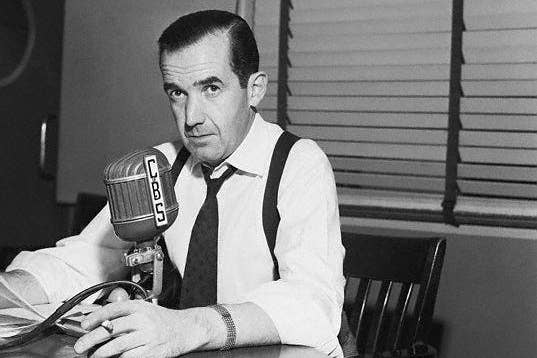Merely Wires and Lights in a Box
55 years later, Edward R. Murrow's cautionary address for a growing medium is still relevant
"This instrument can teach, it can illuminate; yes, and it can even inspire. But it can do so only to the extent that humans are determined to use it to those ends. Otherwise it is merely wires and lights in a box. There is a great and perhaps decisive battle to be fought against ignorance, intolerance and indifference. This weapon of television could be useful."
That quote is from 1958, pulled from a keynote address Edward R. Murrow delivered at the Radio-Television News Directors Association convention in Chicago. The legendary journalist's speech was intended to be a wake-up call to the network executives and suits in charge of content creation for the fledgling medium. Murrow saw the potential of television, and lamented how it was being squandered by people who saw it only as a business opportunity, a medium of empty entertainment for advertising and profit, with no thought for ambition or edification. That approach led to a follow-the-leader homogeneity in programming, with a few archetypes (sitcoms, crime shows, soap operas and westerns) endlessly iterated upon.
"If Hollywood were to run out of Indians, the program schedules would be mangled beyond all recognition," Murrow said. "Then some courageous soul with a small budget might be able to do a documentary telling what, in fact, we have done--and are still doing--to the Indians in this country. But that would be unpleasant. And we must at all costs shield the sensitive citizens from anything that is unpleasant."
"The oldest excuse of the networks for their timidity is their youth."
Edward R. Murrow
That idea of challenging viewers was one Murrow returned to time and again. The content creators had been focusing on producing pabulum for the masses, broadly appealing shows with nothing to say. The news programs were similarly devoid of commentary, as Murrow noted that networks were too afraid to even use their soapboxes to defend the medium on the air. They chose to simply complain about other media picking on them instead of risk alienating viewers by actually having a perspective.
"It is much easier, much less troublesome, to use the money-making machine of television and radio merely as a conduit through which to channel anything that is not libelous, obscene or defamatory," Murrow said. "In that way one has the illusion of power without responsibility."
As businessmen, network executives had every right to produce only that which the people seemed to want, and most people don't want to be challenged or confront differing opinions. But in his own experience, Murrow found that people presented with substantial, thought-provoking content on controversial topics would respond positively to it, whether it was about politics in the Middle East or the ties between smoking and lung cancer.
"The oldest excuse of the networks for their timidity is their youth," Murrow said. "Their spokesmen say, 'We are young; we have not developed the traditions nor acquired the experience of the older media.' If they but knew it, they are building those traditions, creating those precedents every day. Each time they yield to a voice from Washington or any political pressure, each time they eliminate something that might offend some section of the community, they are creating their own body of precedent and tradition."
That is perhaps the greatest takeaway from Murrow's keynote, the understanding that the early days of an artistic medium--much like those of a human being--are formative. It is when a course correction is the easiest, when the future is an expanse of potential stretching out forever and attitudes toward it have not yet ossified. As Murrow put it, "Our history will be what we make it."
[This article was originally published on GamesIndustry International sister site USgamer.]









